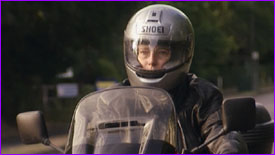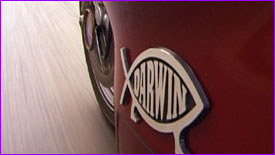 |
 |
|
|  All in a
day's work: Clack commuting to Cambridge.
All in a
day's work: Clack commuting to Cambridge.
|
Diva of the Devonian
Part 4 | Back to Part 3
A career paleontologist
NOVA: So what kind of a kid were you?
Clack: I was always interested in natural history, from as far back as I can
remember. In England we have little "I Spy" books, in which you tick off what
you see. I used to have a whole collection of those, and a whole collection of
the little "Observer's" books. We used to go on holiday specifically so that I
could either look at the local flora and fauna or look for fossils. One of my
earliest holidays was to [the famous English fossil locality] Lyme Regis to see if I could find an ichthyosaur. Never did, of course.
NOVA: What about fossils did you find so interesting?
Clack: I was just fascinated by the idea of something that was so old that
people could never have seen, that you really had to use your imagination to
bring to life. And I was never particularly struck by dinosaurs. They always
seemed to me a bit modern, not mysterious enough. So the further back you could
go the better, for me.
"Dinosaurs always seemed to me a bit modern,
not mysterious enough."
|
|
NOVA: It's amazing to many people that we can know anything at all about
something that happened so long ago.
Clack: You have to use your scientific imagination as well as your creative
imagination. That's one of the things I really like. I mean, you have to impose
some kind of scientific discipline on it in order to make what you come up with
in some way testable, and that's a constraint. But nonetheless, it does require
you to think about how these animals could have lived and worked.
NOVA: So paleontology was an obvious choice for career then.
Clack: Well, as far as paleontology is concerned, I was really struck by a
particular book or set of books that introduced me to the geological periods.
The idea of having something as mysterious as that, as old as that, that nobody
had ever seen, but you could see and could infer from fossil material, was just
amazing. The more unfamiliar the animals were, the better I liked them.
Although I could only get an inkling of this from popular books, it really
turned me on. Though I couldn't know it at the time, the thread of being a
paleontologist has always been there, despite some diversions on the
route.
|  During her daily commute by motorbike,
Clack brings along a trusted friend—if only in spirit.
During her daily commute by motorbike,
Clack brings along a trusted friend—if only in spirit.
|
NOVA: So how does it feel to have made such an important contribution?
Clack: I just feel immensely privileged. I still don't believe quite what I've
found. When I first set out on my paleontological career, I was blessed with a
very good series of finds, and I can't believe that that's continued in the way
it has. You sometimes wonder, where do you go from here exactly? But I've been
fortunate there too. You know, I see my name printed in the textbooks, and I
think, "Yeah! That's good!"
NOVA: Do you owe your streak to tenacity, or do you feel like you have a
particular eye?
Clack: I think my biggest talent is for interpreting crushed and distorted
fossils, and working them into a 3-D shape from this mash. It's the imagination
to try to piece things together into a coherent whole and to interpret
something that perhaps nobody else has been able to interpret.
Continue: The big picture
Photo credits
A Brief History of Life |
Diva of the Devonian
Confessions of a Preparator |
Evolution in Action
Resources |
Transcript |
Teacher's Guide |
Site Map |
The Missing Link Home
Search |
Site Map |
Previously Featured |
Schedule |
Feedback |
Teachers |
Shop
Join Us/E-Mail |
About NOVA |
Editor's Picks |
Watch NOVAs Online |
To Print
PBS Online |
NOVA Online |
WGBH
© | Updated February 2002
|
|
|
|